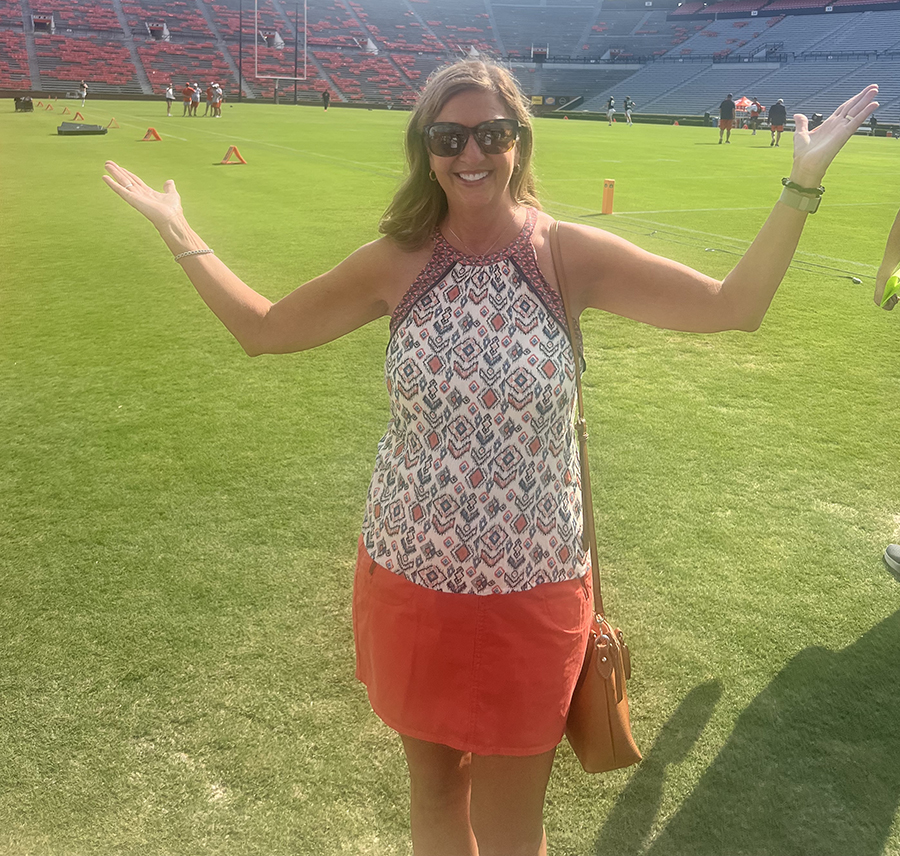
“With this connection, we have the opportunity to potentially get into other major
sports stadiums. We’re talking NFL, huge restaurants and hotels.”
When Porter Kennedy entered the 2019 Tiger Cage Student Business Idea contest, he had no idea where an idea selling paper straws would take him. Now, his
idea might take him to major ballparks across America.
SOstraws, brainchild of Kennedy, a recent Harbert College of Business finance graduate
and Kressie Kornis (Auburn University English graduate) didn’t reach the 2019 Tiger
Cage finals. That didn’t matter — it’s potential for explosive growth struck gold
in November when Texas Rangers Chief Operating Officer Neil Leibman purchased a share
of the business for $20,000, or 5 percent.
“It’s a floodgate opener,” Kennedy explained. Why? As a Major League Baseball front
office executive, Liebman has connections.

“The deal with Neil is really not about the money,” added Kennedy. “With this connection,
we have the opportunity to potentially get into other major sports stadiums. We’re
talking NFL, huge restaurants and hotels.”
Leibman, who oversees the Rangers’ revenue and business operations, met Kennedy and
Kornis while judging the annual TCU Values and Ventures Entrepreneurship Competition
in Fort Worth, Texas. SOstraws finished fourth, pocketing $2,500 and quickly impressing
Leibman.
“I personally invested because it is the right thing to do for the environment,” Leibman
said. “Also, to help these kids start a company that they are so passionate about
makes the investment decision even easier.”
SOstraws began as a local sustainable substitute for plastic straws. But where most
paper straws do not last, Kennedy stresses that his straws are durable and sustainable.
“Most paper straws disintegrate and become soggy, so they were not a good alternative
to plastic straws because they didn’t hold up,” he said. “SOstraws are durable and
is the sustainable alternative for restaurants and other venues to use. They aren’t
buying worthless paper straws that won’t hold up five minutes into your drink. Also,
we can help alleviate some of the pollution with plastic in the oceans and other places.
If we can help people make that first step from plastic to paper straws, that’ll also
lead to more meaningful steps in that area.
“I had no idea that we could get anywhere close to this when we started. Along the
way, we got into one little restaurant in Auburn, then another, and we were hooked.
Now we’re on the verge of breaking into pro sports venues, which is huge.”
“I had no idea that we could get anywhere close to this when we started. Along the
way, we got into one little restaurant in Auburn, then another, and we were hooked.
Now we’re on the verge of breaking into pro sports venues, which is huge. At first
I thought maybe we could get in there and hopefully help some people become more sustainable
in their lifestyles. It’s crazy what it’s becoming.”
Kennedy, who honed his craft at the Tiger Cage Summer Accelerator program at the Auburn University Research Park, credited the Auburn University Entrepreneurship
program for much of SOstraws’ success.
 “The entrepreneurship center at Auburn was definitely instrumental in helping SOstraws
take off,” he added. “I met Neil at TCU, and without the entrepreneurship program
here I never would have known about that competition. Other than that, a lot of the
mentors and professors helped me in writing up these deals. For example, for our deal
with Neil Leibman, I worked very closely with Scott McGlon, the program’s Entrepreneur
in Residence, and with Lou Bifano as well. They were the ones who helped me flesh
this out, legal-wise.”
“The entrepreneurship center at Auburn was definitely instrumental in helping SOstraws
take off,” he added. “I met Neil at TCU, and without the entrepreneurship program
here I never would have known about that competition. Other than that, a lot of the
mentors and professors helped me in writing up these deals. For example, for our deal
with Neil Leibman, I worked very closely with Scott McGlon, the program’s Entrepreneur
in Residence, and with Lou Bifano as well. They were the ones who helped me flesh
this out, legal-wise.”
The 2020 Tiger Cage Student Idea Business Competition is only weeks away with dozens
of young entrepreneurs entering with fresh ideas and hopes of claiming a share of
the $50,000 prize.
“Practice!” Kennedy urged entrants. “Have everything perfect for the competition.
But also, come up with a lot of questions because you are going to get hit with a
lot of questions from judges that you would not have expected that you might now know
exactly how to answer. Being able to think quickly on your feet is important. If you
have a partner in the competition, come up with a few questions that judges might
ask during the competition and go over your responses. Some are obvious questions,
but some you might need to think about how to answer properly.”
Twenty teams will be chosen to compete in the January 31 quarterfinals, eight teams
will compete in the February 28 semifinals, with the annual Tiger Cage Business Idea
Competition finals March 27 at the Auburn University Hotel and Conference Center.


 Degrees & Programs
Degrees & Programs
 Faculty & Staff
Faculty & Staff
 Career Development
Career Development
 Recruiters & Industry
Recruiters & Industry


 “The entrepreneurship center at Auburn was definitely instrumental in helping SOstraws
take off,” he added. “I met Neil at TCU, and without the entrepreneurship program
here I never would have known about that competition. Other than that, a lot of the
mentors and professors helped me in writing up these deals. For example, for our deal
with Neil Leibman, I worked very closely with Scott McGlon, the program’s Entrepreneur
in Residence, and with Lou Bifano as well. They were the ones who helped me flesh
this out, legal-wise.”
“The entrepreneurship center at Auburn was definitely instrumental in helping SOstraws
take off,” he added. “I met Neil at TCU, and without the entrepreneurship program
here I never would have known about that competition. Other than that, a lot of the
mentors and professors helped me in writing up these deals. For example, for our deal
with Neil Leibman, I worked very closely with Scott McGlon, the program’s Entrepreneur
in Residence, and with Lou Bifano as well. They were the ones who helped me flesh
this out, legal-wise.”


